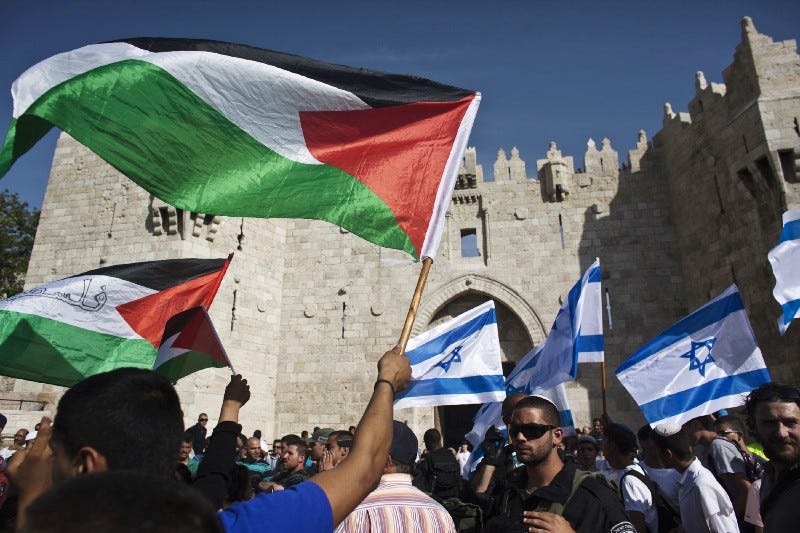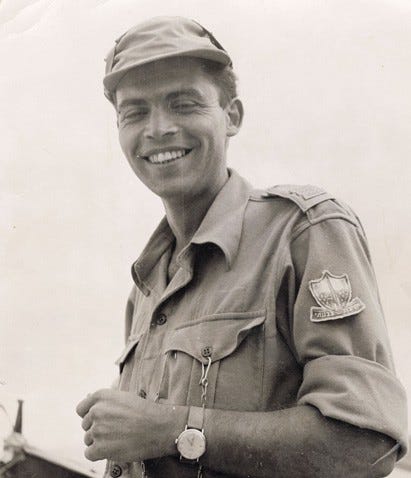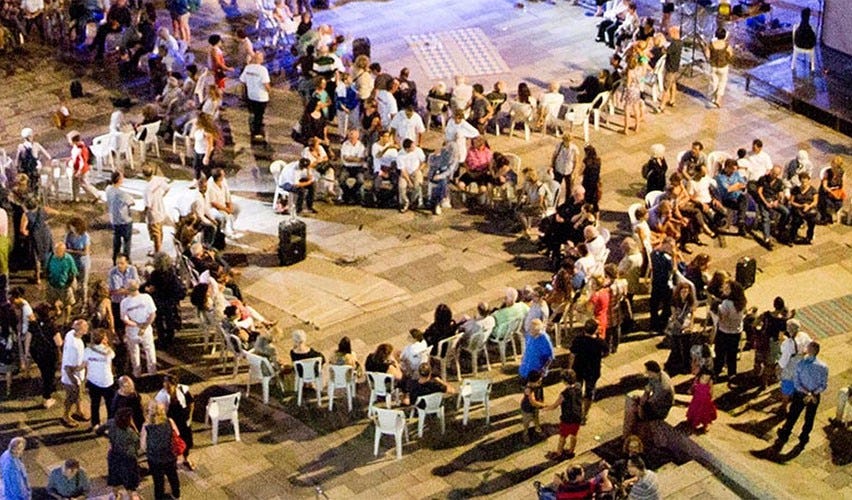Note: this review was originally published on my Medium account on 9/28/20.
To be quite honest, I often don’t read Israeli-leaning or Israeli-authored books about the occupation because I’m afraid. I am afraid of being proven wrong and for all my past convictions to be deconstructed and shown as categorically false.
I chose Miko Peled’s memoir, “The General’s Son” as my first foray into Palestinian-Israeli literature about the occupation because frankly, I thought it was a safe choice. Miko Peled, a man I’ve had the pleasure of meeting personally, is a known Israeli-born Jew turned Palestinian activist. He has denounced Zionism and heavily critiqued the Israeli state for its occupation of Palestinian land and oppression of its people. But he was born in Israel, got his start in the Israeli Defense Forces (IDF), and came from a famously Zionist family. The rare and unexpected dichotomy between his Israeli background and his pro-Palestinian political views caught my amateur Muslim perspective.
But what kept me going in this book were two things: Miko Peled’s relationship with his father’s legacy and the idea of reconciliation.
His father was the renowned IDF Major General, notable Tel Aviv University scholar of Arabic Language and Literature, and radical peace activist — Mattityahu “Matti” Peled.
Miko opens the book by talking about his father but as the memoir progresses, he opens up and talks about his journey towards activism and the people he meets as he begins journeying into Palestine. In my mind, I tried to understand this book and Miko Peled’s story through the lens of his father, Matti Peled. Matti was an incredibly frustrating person to read about in this book, my feelings succinctly summed up by this quote from Susan Abulhawa about Matti.
“[Miko] Peled gives us a personal glimpse of a man that many of us Palestinians could not figure out whether to love or hate”.
I resonate with Abulhawa’s quote, albeit from a non-Palestinian perspective, after finishing this book. An accomplished military man, he served as an officer, the military commander of Gaza, an IDF Major General, and was one of the generals who demanded that Israel begin the offensive now known as the Six-Day War. According to Miko, Matti Peled was a staunch Zionist even until his final days in 1995. He transformed in his later days into a peace activist advocating for dialogue with the PLO and even during his military days, showed remarkable clairvoyance. Right after the end of the Six-Day War, Matti Peled claimed that,
“If we [Israel] kept these lands [the West Bank, Gaza Strip, and Golan Heights], popular resistance to the occupation was sure to arise, and Israel’s army would be used to quell that resistance, with disastrous and demoralizing results. He concluded that this would turn the Jewish state into an increasingly brutal occupying power and eventually into a bi-national state”.
This was a man who loved and believed in Israel, served in its military, and did what he believed needed to be done for the security of the nascent state. Yet throughout the book, we learn of his critiques against the occupation, his work trying to bring about dialogue, and even his work mitigating the plight of IDF soldiers jailed for refusing to serve in the occupied territories. We learn how he became a peace activist after hearing about the Rafah Massacre, how he began dialogues with Egyptian and Palestinian peace activists, and much more.
A son is often the result, but not the sum, of a father’s actions, mistakes and all.
Matti Peled was an incredibly difficult person to learn about because of his seemingly two-sided and opposing nature — a staunch Zionist and an empathetic peace activist. Not only that, but I also can’t help but wonder how Miko Peled himself reconciles his own personal work for Palestine and his inescapable background as the son of a major IDF general. What sorts of mental acrobatics and introspection is needed by a son to untangle the complicated and often conflicting legacy of a father? How would I deal with that legacy if I was in Miko’s shoes? I suppose the only real take-away from these questions about Matti and Miko Peled is that a son is often the result, but not the sum of a father’s actions, mistakes and all.
The second interesting facet of the Israeli-Palestinian issue that this book repeatedly brings up is the concept of dialogue and the possibility of reconciliation between Israelis and Palestinians. Miko shows his thought process in between his storytelling through italicized thoughts such as when he met a Palestinian political prisoner, thinking,
“Why were we demonizing these people [the Palestinians], why do we fear them when we should embrace them?”
Miko first embraces the activist track by attending dialogues and forums intended to bring together victims of the conflict, both from sides. One such forum was the Israeli-Palestinian Bereaved Families Forum where Israelis and Palestinians who have both lost loved ones connect over their shared grief. That is where Peled first begins to see the possible fruits of reconciliation.
But as someone who, in the past has personally attended and even helped organize dialogues between pro-Palestinian and pro-Israeli supporters for nearly two years, Miko’s attitudes towards reconciliation seemed so foreign and almost counter-intuitive to me. I gave up on my particular dialogue forum at UC Santa Barbara after learning about power dynamics from Taher Herzallah who worked for American Muslims for Palestine. I became of the belief that these dialogues, more often than not, do nothing but normalize the occupation and continued oppression of Palestinians. Yet in Miko’s book, I read about certain Palestinian fathers and mothers speaking to their Israeli counterparts about their shared grief and longing for lost ones. A slurry of questions come to mind when reflecting on these Palestinian and Israeli victims.
Should reconciliation and discussion with the other side be classified as normalizing with the enemy? Or simply the way a grieving mother has chosen to deal with the loss of her child?
Those who believe and strive for reconciliation, peace, and a one-state solution — are they the ones who have capitulated to the enemy or are they the ones speaking to the hopeful and seemingly unrealistic eventuality?
Are any of these questions really a binary or is there nuance to be found between the two lines of thought?
As someone who hasn’t attended a dialogue in close to four years and who has spent much of his college years organizing within the Muslim community, often for Palestine, these questions strike me and my beliefs. As a non-Palestinian Muslim who would like to think of himself as an ally to the Palestinian cause, these questions even cause me to be concerned for myself. What if I’m beginning to lose my iron-clad conviction in the cause? Is this the beginning of the unraveling of my beliefs that I was so afraid of? On further reflection, it seems odd that my heart sees belief in reconciliation, as portrayed by these Palestinian and Israeli elders grieving together, as a capitulation. I suspect that’s because a prerequisite to peace is justice.
Justice seems so far away now.
As a Muslim active in his community, I understand that I live in a pro-Palestinian bubble. For Muslims, it’s safe to say that being pro-Palestinian is tantamount to a central theological tenet like prayer or charity. But bubbles, regardless of how much I believe them to be true and correct, are still bubbles. Bubbles stunt growth and prevent the challenging of ideas and beliefs. It is the exposure to new ideas and challenges to old ones that often make us stronger and more nuanced in our outlook, perfect for a world that could only hope to be described as infinite shades of black, white, and grey.
I still hold firm my pro-Palestine convictions and I pray to God that I do so until my dying days. I still wish to be an ally to the Palestinian cause even if it’s more difficult now that I’ve left the hyper-activist sphere of college. This book has not changed my beliefs on that nor am I trying to portray myself as an expert on anything.
What this book did do was provide the slightest peek into the other side, priming myself for further reading and further education. I fully intend to dive deeper into Israeli and Palestinian literature to challenge my assumptions and educate myself further. I am beginning to learn that seeking knowledge about the other intellectual shades of the world does not make you a less fervent supporter of one side, but rather a more complete fighter for the truths you believe in.




